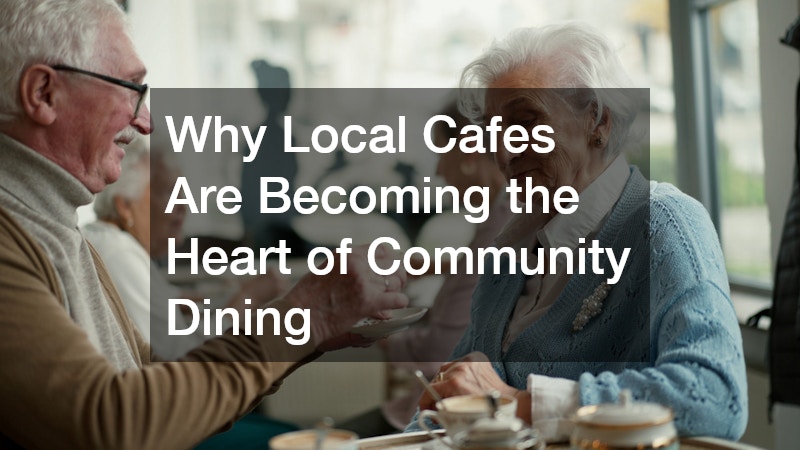
In recent years, local cafes have become increasingly central to community dining experiences, offering more than just coffee and pastries. They have evolved into essential social hubs providing a sense of belonging and community engagement.
What Makes Local Cafes Stand Out Among Dining Options?
Unique Atmosphere and Décor
Local cafes are known for their unique, cozy, and inviting atmospheres, setting them apart from the sterile environments of many chain establishments. Each cafe typically has its distinct decor that reflects the personality of the owner, which attracts a diverse group of patrons looking for more than just a seat to drink their coffee.
The intimate and warm settings of local cafes often make them ideal spots for casual meetings, first dates, and personal reflection. Patrons appreciate the effort put into creating a space that feels like a home away from home, adding to the overall experience of dining.
The distinct aesthetic of a local cafe can also be a reflection of the community’s culture and history, drawing in both locals and tourists. By capturing the spirit of the neighborhood through art and design, cafes can create a rewarding sense of place for their patrons.
Personalized Customer Service
Local cafes often provide a level of personalized service that larger chains can’t match, with baristas who remember names and orders, creating a welcoming experience for regulars. This attention to detail in customer service fosters a sense of community and belonging that is hard to replicate in larger establishments.
The personal connections formed between cafe staff and their patrons often lead to long-lasting relationships. Customers feel valued and appreciated, which cultivates loyalty and repeat business as they return time and again to their favorite spots.
Personalized customer service extends beyond just remembering names; it often includes engaging in friendly conversations and genuine interest in customers’ lives. This level of engagement makes local cafes not only places to dine but also places where meaningful personal interactions happen.
How Do Local Cafes Contribute to Community Building?
Support for Local Artists and Musicians
Many cafes offer their space for local artists to display their work or host live music, providing a platform for the arts and enhancing the cultural vibrancy of the community. This involvement in the arts brings in patrons who are interested in supporting and engaging with local creatives.
Cafes that host live performances or showcase art provide opportunities for artists to gain visibility and exposure, which might be more challenging to attain otherwise. This engaging environment encourages a diverse group of people to come together to appreciate and celebrate local talent.
In fostering a community culture that values creativity and expression, cafes contribute significantly to the community’s artistic scene. The support for the arts not only benefits the artists but also enriches the cultural landscape of the community, drawing visitors and residents alike.
Organizing Community Events
Cafes often serve as venues for community events such as book clubs, open mic nights, and fundraisers, fostering connections among community members. These events transform cafes into bustling hubs of activity where strangers can become friends.
The versatility of a cafe’s space means it can cater to a variety of events, from intimate gatherings to larger community meetings. Hosting these events encourages collaboration and communication across various demographics and interest groups within the community.
By organizing and hosting community activities, cafes play a proactive role in strengthening neighborhood bonds and networks. They offer a neutral ground where individuals from all walks of life can come together to share ideas and create experiences.
Why Are Local Cafes Important for Sustainable Practices?
Commitment to Sourcing Locally
Local cafes frequently prioritize sourcing ingredients and products from local suppliers, reducing their carbon footprint and supporting other local businesses. This commitment to local sourcing ensures fresher products while promoting economic sustainability within the community.
By choosing to work with local vendors, cafes reinforce community interdependence and help bolster the local economy. This practice not only strengthens ties within the community but also reduces the need for long-haul transportation, contributing to environmental sustainability.
Beyond the environmental benefits, sourcing locally connects cafes with the agricultural and culinary culture of their region. By showcasing local flavors, cafes offer unique dining experiences that reflect the best of what the area has to offer.
Leading the Way in Eco-Friendly Initiatives
Many cafes implement sustainable business practices, such as reducing waste through reusable or biodegradable materials, and encouraging a culture of sustainability within their communities. This leadership in sustainability helps raise awareness and inspire others to follow suit.
Incorporating eco-friendly practices often results in cafes becoming educational platforms as well, where customers can learn about sustainable alternatives and green living. This commitment to the environment fosters a collective responsibility within the community towards protecting natural resources.
Additionally, by championing sustainability, local cafes manage to appeal to environmentally-conscious consumers and tap into a growing market. Their efforts demonstrate the feasibility and benefits of eco-friendly business models in everyday operations.
Local cafes are much more than places to get your caffeine fix; they are integral parts of their communities. By offering unique atmospheres, fostering community connections, and championing sustainable practices, they truly are the heart of community dining.



